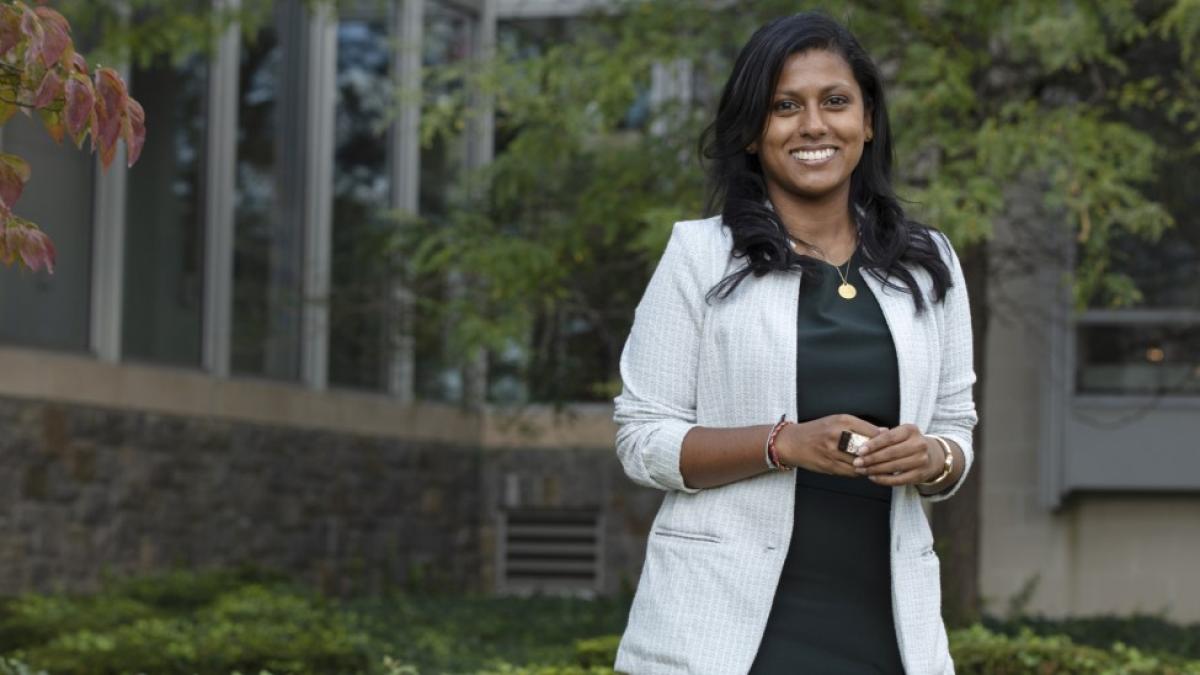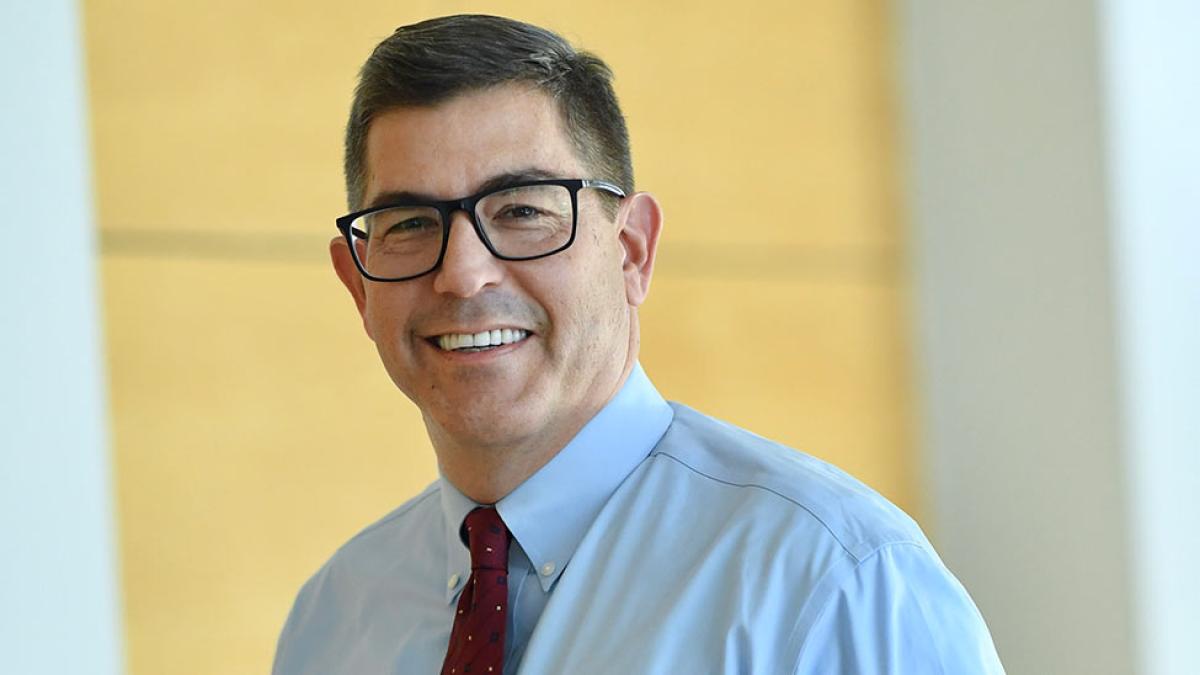The Elisabeth Haub School of Law at Pace University is proud to announce that the 2025 Ottinger Award for Faculty Achievement has been awarded to Achinthi Vithanage, Professor of Law for Designated Service in Environmental Law & Executive Director of Environmental Law Programs. The Richard Ottinger Faculty Achievement Award is awarded annually by the Faculty Development Committee, in consultation with the Dean, in recognition of a full-time professor’s outstanding service to the law school, the legal profession, or both. The award generally is based on the faculty member’s outstanding service during the previous academic year.
Elizabeth Dank '05: #LifeAtTikTok
Elizabeth Dank ’05 recently embarked on a new journey in her career: Product Policy Manager for Adult Nudity and Sexual Activity on the Global Trust and Safety team at TikTok. Elizabeth has always loved to dig in to complex problems and has worked in the field of gender-based violence throughout her career in both legal and non-legal roles – crediting, in part, the Pace Women’s Justice Center for directly influencing the course of her career. Prior to her new role at TikTok, she spent time with the New York City Administration for Children's Services (ACS), in the Queens District Attorney’s Office in the Domestic Violence Unit, and eleven years with the New York City Mayor's Office to End Domestic and Gender-Based Violence (ENDGBV). Learn more about Elizabeth, her time at Haub Law, her career and current role at TikTok, what continues to inspire her career path, and more in this Alumni Q&A.
Let’s jump right in – you recently started a position at TikTok as a Product Policy Manager focused on Adult Nudity and Sexual Activity – what is your day-to-day like there?
Across the Trust and Safety Issue Policy team, we are developing and enforcing cutting-edge policies and practices aimed at keeping the platform safe and welcoming. I am working specifically on Adult Nudity and Sexual Activity and focusing on policies related to exploitation and abuse. It has been so interesting to translate my on-the-ground work in gender-based violence into a tech space. Unfortunately, the harms that can occur IRL can also happen in online communities and we are working hard to proactively prevent and address abuse and exploitation and provide support for survivors. It is a huge responsibility to know that the work we are doing will impact over 1 billion users across the globe.
What is it like to work for a huge social media platform?
#LifeatTikTok is different than anything I have experienced professionally! I am so impressed by the focus on employee well-being, the transparency and communication from leadership and the ways our commitment to creativity and joy on the platform are endlessly woven into the workplace too. Not only am I passionate about the work I get to do here, I am also having fun!
You have spent your career primarily focused combatting domestic violence and gender-based violence – thank you – I imagine at times that this can be very emotionally draining, what keeps you going and/or what have been the most fulfilling parts of your job?
I have two little girls who inspire me daily. I hope that through my work I might have a small impact on making the world they grow up in safer and more equitable.
Jumping back for a second, you started your legal career as an agency attorney with the New York City Administration for Children's Services (ACS) and then as an ADA in the Queens District Attorney’s Office in the Domestic Violence Unit – can you talk about those experiences?
Starting my career in litigation roles provided me with invaluable experience and numerous transferable skills in public speaking, writing, analysis, negotiation, mediation, thinking on your feet - just to name a few! There is often a sink-or-swim approach to new hires in government litigation positions, which was terrifying at the time but really forced me to work hard and strengthen my skills every day.
Working directly with families and survivors who experienced child abuse, domestic violence and sexual violence was both incredibly difficult and rewarding. The families I came into contact with through these positions left indelible impressions on me and motivated me to seek to improve NYC systems and remove barriers.
On a personal level, while at these two agencies, I was fortunate to have incredibly supportive bosses and colleagues who became lifelong friends. And I will always be thankful to ACS, as they unknowingly paired me with an officemate who would, years later, become my husband!
From the DA’s Office, you transitioned to the New York City Mayor's Office to End Domestic and Gender-Based Violence (ENDGBV), where you spent the last 11 years doing impactful work in a variety of roles, what was your day-to-day like there?
No two days (or even hours!) were the same at ENDGBV and that was one of the things that made the work so interesting and engaging. It was such a privilege to work alongside my colleagues and our partners to develop, enhance and innovate the City's response to gender-based violence. We wrote novel legislation, developed critical policies, designed first-of-its-kind programming, and worked every day to strategically coordinate and align approaches across numerous City agencies to enhance support for survivors. My ENDGBV colleagues are some of the most passionate people I have met and it was incredible to work in an office that was so grounded and focused on a shared mission.
Did you always want to be a lawyer?
Actually, no! I originally thought I might be a psychologist or a social worker. I even grappled with this during my first year of law school and wondered whether I had chosen the right path! I'm glad I persevered though as I've really enjoyed my career as a lawyer and believe that a legal education is transferable in so many beneficial ways.
What was your path to law school and why Pace?
During my junior year in college, I interned at a domestic violence shelter. Working closely with shelter staff and resident survivors, I was able to better understand both the barriers and resources that impacted survivors. This experience largely inspired me to go to law school and continue working to support survivors as an attorney. I chose Pace because of the excellent public interest program, immersive clinical and externship options and access to the legal community in NYC.
During my junior year in college, I interned at a domestic violence shelter. Working closely with shelter staff and resident survivors, I was able to better understand both the barriers and resources that impacted survivors. This experience largely inspired me to go to law school and continue working to support survivors as an attorney.
What were some of your most impactful experiences during your time at Pace?
Participating in the domestic violence clinic through the Pace Women's Justice Center directly influenced the course of my career. I believe strongly in the importance of clinical programming and highly recommend it to all new law students! I also had great domestic violence-related internships at community-based organizations and government agencies that helped to inform my career path. Rebecca Fialk was my clinical instructor and was fantastic at guiding me through my first client interviews and court appearances and motivating me to pursue litigation early in my career. I also had an excellent experience in trial advocacy with Robert Altchiler and found the skills I developed there so helpful in my first years as a litigator and in other roles throughout my career. One of the courses that stuck with me the most was the Prisoner's Rights class with Professor Michael Mushlin. It helped me to stay balanced and grounded as a prosecutor and inspired me to dig deeper into issues of sexual violence experienced by people in custody.
Do you have any advice for current or future law students?
If you are interested in the public sector, explore clinics, internships and volunteer opportunities across different agencies and organizations and be open to the different paths your legal career may take you. My career took many pivots and turns that I did not anticipate and it has been wonderful to continue to learn and grow in different ways with each position.
What are some of your passions aside from the law?
Outside of work, you can often find me exploring NYC, traveling with my family, going for a bike ride or baking with my kids.


